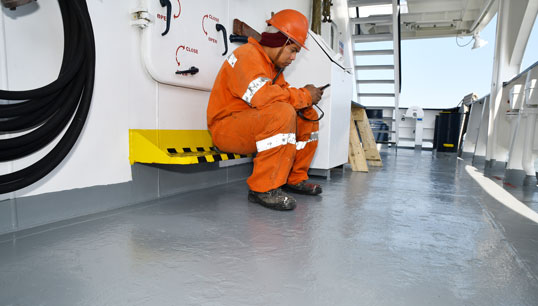
Too much social media activity while at sea may damage your mental wellbeing, a new research report has concluded.
The study – which examined more than 150, mainly Filipino, seafarers serving on deepsea cargoships – found that those who spent the longest off-duty periods online were more than two-and-a-half times more likely to have anxiety problems than others onboard.
The research also uncovered significantly higher rates of depression disorders among seafarers who spent more than four hours a day using social media.
Carried out by experts in Belgium and the Philippines, the research examined the daily time that crew members spent using social media. The resulting report – published in the International Maritime Health Journal – warns that 'the impact of social media exposure and mental illness on workers' occupational health cannot be overstated'.
One-third of the seafarers taking part in the study said they spent up to two hours on social media during or after their work shifts. Around three in 10 reported a daily total of two to four hours, and a further 30% spent more than four hours using social media every day.
Researchers found that approximately 30% and 37% of the seafarers had mild, moderate, or severe anxiety and depression disorders. The prevalence of anxiety was 2.68 times higher among seafarers who spend from two to more than four hours on social media each day, than those who spent between zero to two hours online. A higher prevalence of depression was also detected among seafarers using social media from two to more than four hours daily.
The report says it is not surprising that seafarers suffer mental health issues as a result of inherent occupational health hazards and the social isolation caused by long periods away from home. However, while other studies have examined depression and anxiety among seafarers there is no clear consensus on the scale of the problems.
Long periods on social media are likely to result in reduced levels of sleep quality and this may in turn serve as 'a mediator on the pathway to depression or anxiety'. Excessive time spent on social media may also increase the risk of experiencing cyber-bullying, which may lead to an increased risk of depression.
Anxiety and depression disorders were higher amongst seafarers with less than 10 years' experience, and were also higher among non-Catholic seafarers.
Other, more general, studies have also identified a link between long hours of daily social media use and high rates of depression and anxiety. Understanding these connections is vital, because depression and anxiety can go on to fuel other problems, such as impaired social relationships and an increased risk of substance abuse, mental health problems, and suicide.
Tags
More articles
MLC breach to be raised with the ILO after flag of convenience 'rides roughshod' over seafarers' rights to internet access
Nautilus International has asked the ITF to formally raise a breach of the Maritime Labour Convention with the ILO after the crew of a flag-of-convenience vessel were left without the broadband access necessary to contact their families.
How yacht crew can stop a cyber threat
MCA asks for feedback on yacht crew accommodation
The Maritime and Coastguard Agency (MCA) is conducting a review on substantially equivalent crew accommodation on large yachts.
